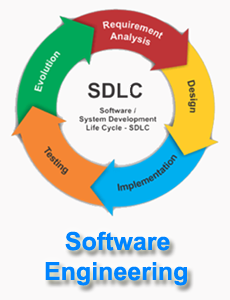Phase of SDLC
Phase of SDLC
SDLC (Software Development Life Cycle) is a term used in software development to narrate a procedure for planning, designing, creating, testing, and deploying software or application.

SDLC is a systematic process for building software that ensures the quality and correctness of the software built. SDLC process aims to produce high-quality software that meets customer expectations. SDLC mainly contains following phases.
- Requirment gathering
- Feasibility study & Analysis
- Designing
- Coding and Implimentation
- Testing
- Installation/Deployment
- Maintenance
Planning and requirement analysis: Requirement Gathering is the most important stage in SDLC. Business analyst and project organizer do client meeting to gather all the requirements of the clients like what to build, who will be the end-user, what is the purpose of the product, etc. Before creating a product, a core understanding or knowledge of the product is very necessary.
Defining requirements: Once the requirement analysis is done, the next stage is to surely document the software specifications and get them approved by the project stakeholders. This can be accomplished through the "SRS"- Software Requirement Specification document, which embraces all the product elements to be created and developed during the project life cycle.
Designing: In this stage, the requirements gathered in the SRS document is used as information to obtain the software architecture. Moreover, this phase also consists of storyboarding or wireframing software that is needed for functionality. Through this, the developers then create either rough working models, or illustrates how the software will work, how it will look, how usage flows will move from screen to screen, and more.
Implementation or Coding: In this stage of SDLC, the exact development begins, and the programming is built. The execution of design begins concerning script code. Developers have to follow the coding guidelines defined by their management, and programming tools like compilers, interpreters, debuggers, etc. are used to generate and implement the code.
Testing: After the code is generated, it is tested against the specifications to ensure that the products are solving the needs directed and inferred during the requirements stage. During this phase, several testing like unit testing, integration testing, system testing, and approval testing are done.
Deployment: Once the software is approved, and no bugs or errors are asserted, then it is deployed. Later, based on the assessment, the software is delivered as it is or with suggested augmentation in the object segment. After the software is deployed, then its sustenance begins.
Maintenance: Once the client starts using the developed software, then the real issues start coming up. In this stage, the team is required to fix the issues, roll out new features and refine the functionalities as required. The method where the care is taken for the finished product is thus known as maintenance.

